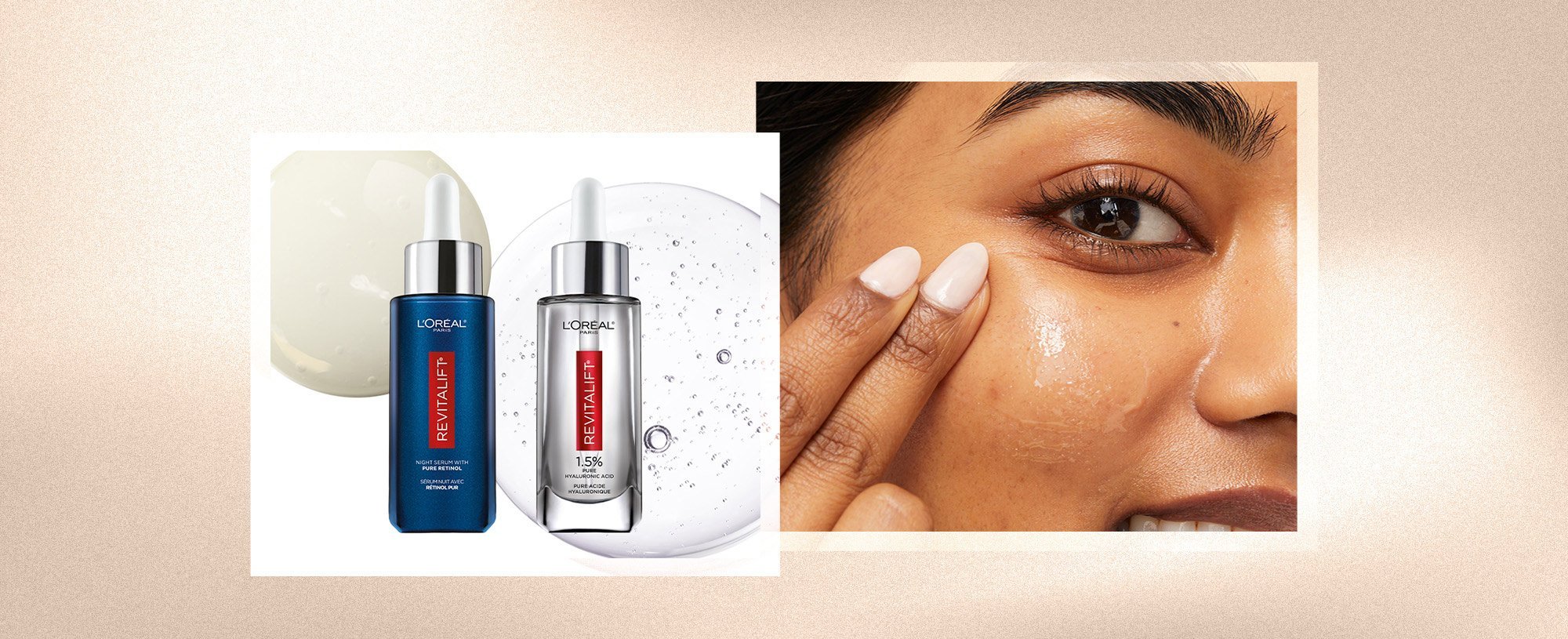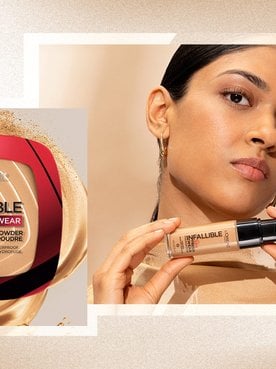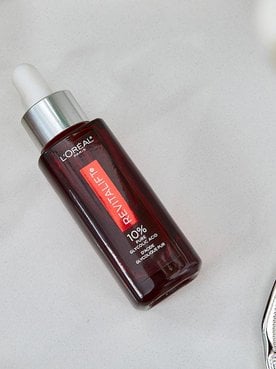As beauty experts, we’re constantly asked about skincare ingredients and how they work. And one of the most common questions we get is: Can you use hyaluronic acid with retinol? It makes sense—hyaluronic acid and retinol are two of the most popular and well-known skincare ingredients on the market. The former has a well-earned reputation as an effective anti-aging ingredient that can help address fine lines, wrinkles, and uneven skin texture, while the latter is a humectant moisturizer that helps hydrate the skin. And while retinol and hyaluronic acid may not seem like the most obvious pairing at first, combining these two ingredients can help promote smoother, plumper, and more youthful-looking skin.
To help explain the benefits of these ingredients and why they’re such a powerful pairing, we tapped L’Oréal Paris consultant and board-certified dermatologist Dr. Erin Gilbert, MD, FAAD. Read on to learn the differences between retinol vs. hyaluronic acid, discover the benefits of each, and learn how you can use retinol and hyaluronic acid together in your skincare routine.
What Is Retinol?
According to the Cleveland Clinic, retinol is a form of vitamin A that can help address the visible signs of aging when used topically. It can be found in a wide range of over-the-counter skincare products, including serums, moisturizers, and eye creams.
Retinol and other retinoids (a broad term used to describe vitamin A derivatives) are often considered must-have skincare ingredients for mature skin, but they can also be used to help address a variety of other skin concerns—including dark spots, rough texture, and post-blemish marks. If you have any of these concerns, retinol may be worth adding to your skincare routine.
Try It: We recommend using a retinol serum like the L’Oréal Paris RevitaLift Derm Intensives Night Serum, 0.3% Pure Retinol, which helps to smooth and brighten the skin while visibly reducing wrinkles over time.

How does retinol work?
When used topically, retinol helps exfoliate the skin to remove dead skin cells that can clog pores and lead to an uneven skin texture. The Cleveland Clinic notes that products with retinol can also help plump the skin, smoothing the appearance of fine lines and wrinkles. The specific benefits, however, will depend on the retinol product you’re using.
Retinol side effects
Over-the-counter skincare products with retinol are generally relatively gentle. However, some find that retinol can be irritating, especially if their skin is naturally dry or sensitive. That doesn’t mean those skin types can’t use retinol—just that you have to be more choosy about how and when you use it.
Retinol can also make your skin more sensitive to ultraviolet radiation from the sun. When you’re using retinol, it’s always a good idea to double up on your sun protection and stay in the shade when possible to avoid sun damage.
How to introduce retinol into your routine
If you’re a first-time retinol user, it’s best to start slowly to help mitigate the risk of irritation. As a general rule, you’ll want to start with the lowest-dose retinol product you can find and introduce it into your routine gradually. Start with a once-weekly application and gradually ramp your way up to every other night or even nightly, depending on how your skin responds. Of course, remember that this is just a general rule of thumb—it’s always best to consult the directions on the product’s packaging for a clearer look at how (and when) to apply it.
Shop the Product
What Is Hyaluronic Acid?
“Hyaluronic acid is a sugar known for its hydrating benefits,” says Dr. Gilbert. This humectant ingredient helps draw moisture into your skin, promoting a smooth, supple appearance. (And don’t let the word “acid” mislead you—hyaluronic acid doesn’t exfoliate the skin like alpha-hydroxy acids and beta-hydroxy acids).
Generally speaking, all skin types can benefit from using hyaluronic acid, including those with dry skin, combination skin, oily skin, and even sensitive skin (depending on the formulation). According to Dr. Gilbert, it’s a great addition to any skincare regimen, either alone or in addition to a moisturizer for drier skin.
Try It: If you’re looking for an excellent hyaluronic serum for your routine, we recommend the L’Oréal Paris RevitaLift Derm Intensives 1.5% Pure Hyaluronic Acid Serum. The non-greasy formula delivers intense moisture, immediately hydrating the skin and helping to promote a plumper, firmer appearance with continued use.

Shop the Product
Can You Use Hyaluronic Acid With Retinol?
So, we return to the question at hand: Can you use retinol and hyaluronic acid together? In most cases, yes. In fact, you’ll often find these two ingredients working in tandem in skincare formulations (including the aforementioned retinol serum). Retinol has many benefits, but it can be drying for some. Adding hyaluronic acid to your regimen may help reduce that dryness and keep your skin feeling hydrated.
To that end, the American Academy of Dermatology (AAD) advises using a non-pore-clogging moisturizer with hyaluronic acid to help combat dryness. “Hyaluronic acid is a very neutral and efficient moisturizing component for your skin regimen,” says Dr. Gilbert. “In its pure form, [hyaluronic acid] is rarely formulated with pore-clogging ingredients [so] it is unlikely to cause breakouts, even when layered with other moisturizers,” she notes. Still, it’s a good idea to seek our products designed for your specific skin type—and if you are prone to clogged pores, make sure your chosen moisturizer says “non-comedogenic” on the label.
Should you use hyaluronic acid before or after retinol?
When (and how) you use retinol and hyaluronic acid in your skincare routine should be dictated by your skin type and concerns, as well as the type of products you’re using. Generally speaking, products should be applied in order of consistency, from thinnest to thickest (that way, everything can absorb as intended).
Things can get a bit trickier when you’re using serums with similar consistencies. In this case, there’s no concrete answer to the question, “Should I use retinol or hyaluronic acid first?” However, if you’re prone to dryness or sensitivity, we suggest applying the hyaluronic acid serum first, followed by the retinol. And if your skin is really dry, you can “sandwich” your retinol between layers of hyaluronic acid serum or moisturizer for added hydration.
Keep in mind that no matter which application method you choose, it’s important to follow with moisturizer. “Moisturizing over retinoids—or mixing them with a moisturizer—often helps in the first few weeks of use when your skin is getting acclimated to it,” says Dr. Gilbert. If you’d prefer to streamline your routine, consider picking up a moisturizer formulated with retinol, such as the L’Oréal Paris RevitaLift Pressed Night Moisturizer with Retinol + Niacinamide. The gentle formula provides deep hydration and helps improve the appearance of skin tone and texture over time.

Can you mix hyaluronic acid with retinol?
While hyaluronic acid and retinol often play well together, it’s best to avoid mixing up your own skincare concoctions. You could end up diluting the products, altering their texture or consistency, or even damaging your skin if you’re not careful. If you want to use retinol and hyaluronic acid in your skincare routine, do so in separate skincare steps or look for products formulated with both ingredients—these will contain the appropriate concentrations of each ingredient to yield the best benefits.
Editor’s note: Hyaluronic acid and retinol are included in many different types of products, including facial moisturizers, serums, and eye creams. Every product comes with its own set of instructions, so it’s important to refer to the product packaging first and foremost. When in doubt, seek the advice of your doctor or dermatologist.
Shop the Product
What Is Vitamin C?
Vitamin C is another ingredient frequently included in anti-aging skincare products. According to Dr. Gilbert, products with this powerful antioxidant can help brighten and even the skin’s tone. Topical vitamin C may also help improve the appearance of fine lines, wrinkles, and large pores.
Try It: We love the L’Oréal Paris RevitaLift Derm Intensives 12% Pure Vitamin C + E + Salicylic Acid Serum. This serum is formulated in air-tight packaging to boost stability and it serves as a great solution to address the appearance of fine lines, uneven skin tone, and dullness with continued use.
Shop the Product
Can You Use Vitamin C and Retinol Together?
According to Dr. Gilbert, pairing retinol with vitamin C is usually doable, but it depends on your skin’s needs and your chosen products. Ultimately, she says, trial and error may be the best approach when combining these ingredients, and it’s important to pay attention to your skin along the way. If you do find that your skin’s more sensitive, you may want to try using vitamin C in the morning and retinol in the evening (versus mixing vitamin C and retinol together at the same time). Always stick to the product label’s instructions when in doubt, and consult your dermatologist if you have any questions regarding your skincare routine.
How To Use Retinol, Hyaluronic Acid, and Vitamin C in Your Skincare Routine
If you’re interested in incorporating retinol, hyaluronic acid, and/or vitamin C into your skincare routine but aren’t quite sure where to start, keep reading. We’re breaking down some of our top tips ahead.
Try a product formulated with all three ingredients
If you’re not sure how to go about layering retinol, hyaluronic acid, and vitamin C, keep things simple by using a product that’s formulated with all three ingredients. For morning routines, we love the L’Oréal Paris RevitaLift Triple Power Moisturizer with SPF 30. This moisturizing cream with vitamin C, Pro-Retinol, and hyaluronic acid visibly reduces the appearance of wrinkles and helps firm and brighten the skin. Plus, it’s formulated with broad-spectrum SPF 30 sunscreen to help protect your skin against damaging UVA and UVB rays.
In the evening, try the L’Oréal Paris RevitaLift Triple Power Anti-Aging Overnight Mask. This anti-aging overnight mask contains the same vitamin C, pro-retinol, and hyaluronic acid formulation, but is designed for your nighttime routine. It has the consistency of a lightweight moisturizer with a non-greasy finish that makes it ideal for dry skin and mature skin.
Editor’s Tip: Sensitive skin types can opt for the L’Oréal Paris RevitaLift Triple Power Anti-Aging Moisturizer Fragrance-Free, which offers the same benefits and ingredients as the daytime moisturizer in a fragrance-free formula. Just remember to follow it up with a broad-spectrum sunscreen to help shield your skin from the sun.
Shop the Products
Alternate vitamin C And retinol daily
If you want a simplified skincare routine or have sensitive skin, consider using vitamin C and retinol on alternating days. This might look like applying vitamin C and hyaluronic acid in the morning on one day, and then the following day using retinol and hyaluronic acid together. This ensures you’re using all three ingredients, but lessens the load on your skin since usage is more spread out.
Don’t forget SPF
As we mentioned earlier, retinol can make your skin more sensitive to the sun’s rays, per the American Academy of Dermatology (AAD). When using retinol (even if you’re only applying it at night), the AAD recommends being extra diligent about using a broad-spectrum sunscreen with SPF 30 or higher daily and taking safe sun-protective measures when spending time outdoors. These measures include wearing a wide-brim hat, seeking shade during the sun’s peak hours (10 a.m. to 2 p.m.), and reapplying SPF at least every two hours when spending time outside. If you need a recommendation, we’re big fans of the L’Oréal Paris Bright Reveal Broad Spectrum SPF 50 Daily UV Lotion. The lightweight formula contains vitamins C and E and helps shield against sun damage while helping to brighten, even, and smooth the skin’s appearance over time.
Shop the Product
Next Up: When Can You Start Using Retinol?
Photo courtesy of L’Oréal Paris







